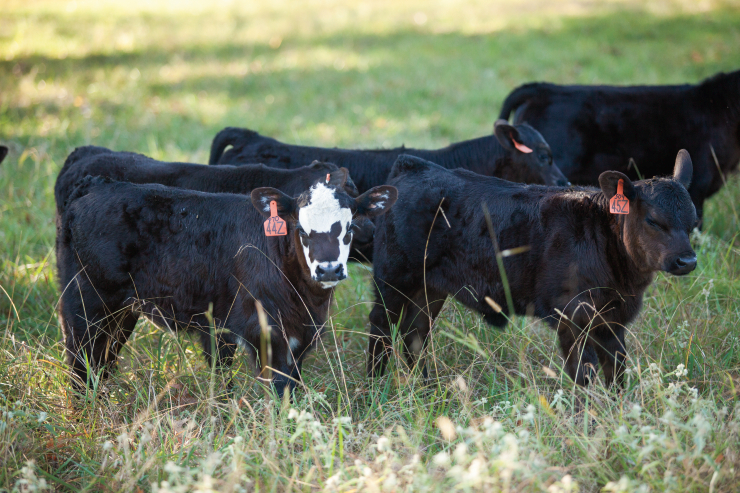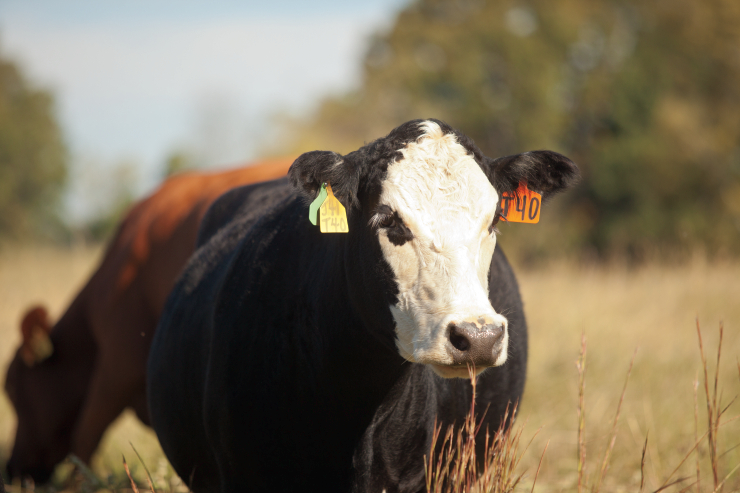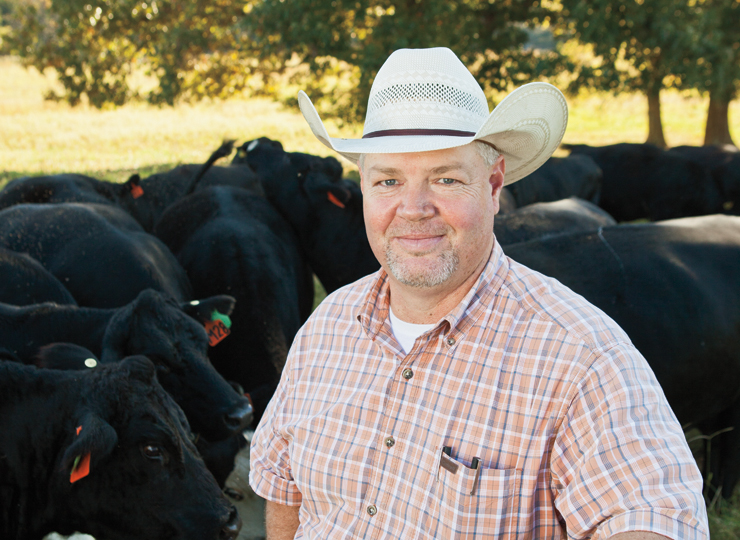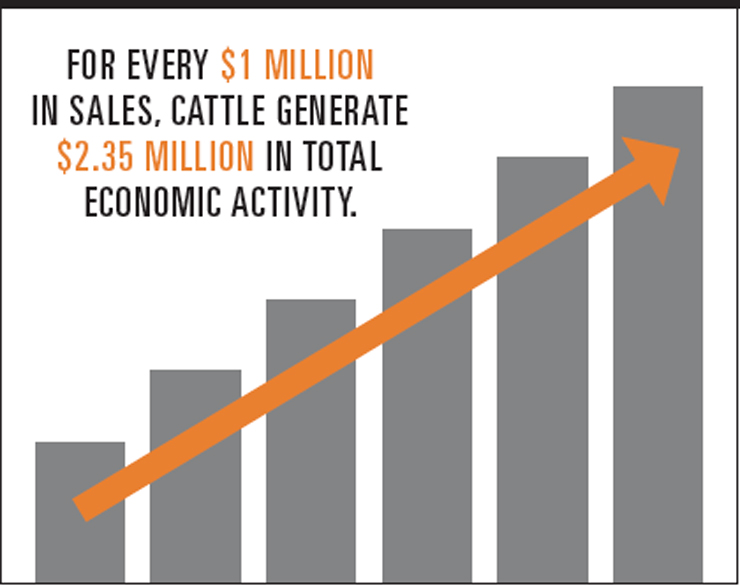Home > Mississippi > Mississippi Crops & Livestock > Mississippi Cow Country
Mississippi Cow Country
In partnership with: Mississippi Department of Agriculture and Commerce
 Nearly a million cattle graze in Mississippi’s 82 counties, generating jobs, income and food as broadly as any farm product. The state’s cattle and calves ranked seventh among the highest valued agricultural commodities in 2011, according to Mississippi State University. About 18,000 farms, from small to large, earn a livelihood from beef cattle in Mississippi, which is blessed with a climate ideal for year-round grazing and a diverse forage base with highly adapted grasses. “We’re well-suited for growing cattle because we can grow grass very well,” says D.R. Bozeman, a third-generation cattle farmer in central Mississippi. “You take into consideration your winter grazing – you can grow grass year round. It’s a great way to utilize your land. Some is rolling and not suitable for farming and is a good way to produce income on land here.” Statistics show that Mississippi cattle greatly impact the economy. For every $1 million in sales, cattle generate $2.35 million in total economic activity, $380,000 in household wages and 17.5 additional jobs, according to the United Soybean Board. Mississippi’s cattlemen largely run cow-calf operations, which consist of mother cows that give birth to calves annually. Weaned calves generally sell to stocker operations and feedlots, where they grow to market weight. As with the national downward trend, Mississippi’s cattle numbers have declined around 15 percent in the last decade. However, the recent trend has shown the state’s total cattle inventory trending upward of around six percent year-over-year to reach 950,000 head at the start of 2012, according to the National Agricultural Statistics Service.
Nearly a million cattle graze in Mississippi’s 82 counties, generating jobs, income and food as broadly as any farm product. The state’s cattle and calves ranked seventh among the highest valued agricultural commodities in 2011, according to Mississippi State University. About 18,000 farms, from small to large, earn a livelihood from beef cattle in Mississippi, which is blessed with a climate ideal for year-round grazing and a diverse forage base with highly adapted grasses. “We’re well-suited for growing cattle because we can grow grass very well,” says D.R. Bozeman, a third-generation cattle farmer in central Mississippi. “You take into consideration your winter grazing – you can grow grass year round. It’s a great way to utilize your land. Some is rolling and not suitable for farming and is a good way to produce income on land here.” Statistics show that Mississippi cattle greatly impact the economy. For every $1 million in sales, cattle generate $2.35 million in total economic activity, $380,000 in household wages and 17.5 additional jobs, according to the United Soybean Board. Mississippi’s cattlemen largely run cow-calf operations, which consist of mother cows that give birth to calves annually. Weaned calves generally sell to stocker operations and feedlots, where they grow to market weight. As with the national downward trend, Mississippi’s cattle numbers have declined around 15 percent in the last decade. However, the recent trend has shown the state’s total cattle inventory trending upward of around six percent year-over-year to reach 950,000 head at the start of 2012, according to the National Agricultural Statistics Service. 
Business of Bovines
Stocker cattle production shows strength in the Mississippi beef industry, says Jane Parish, extension beef cattle specialist with MSU. Stocker cattle include weaned calves fed to higher weights before moving to a feedlot. About 400,000 head of stocker cattle reside in the state annually, according to the university. “It seems like that there’s maybe a bit of growth on the stocker side in particular,” Parish says. “We see cattle coming in from other states east of us. Typically, a lot of those cattle will graze annual ryegrass.” Year-round grass and well-adapted forages prove some of Mississippi’s biggest assets. In fact, Parish says Mississippi farmers have found opportunities to sell forages to states stricken with severe drought in 2012 and prior years.  The state’s cattle farmers also have a variety of natural resources available to them, such as byproducts from Mississippi’s large poultry industry that can be used as fertilizer for pastures. Ethanol plants produce feed byproducts in the form of distillers’ grains. And, in general, land is more reasonably priced and less cost prohibitive in Mississippi than other states. Yet, costs have reached historic highs for other items, namely feed, fuel and fertilizer. A short nationwide crop from the 2012 drought further boosted feed prices. “In 2012, we had really great cattle prices, but fertilizer and fuel are through the roof and feed prices are going up,” Bozeman says.
The state’s cattle farmers also have a variety of natural resources available to them, such as byproducts from Mississippi’s large poultry industry that can be used as fertilizer for pastures. Ethanol plants produce feed byproducts in the form of distillers’ grains. And, in general, land is more reasonably priced and less cost prohibitive in Mississippi than other states. Yet, costs have reached historic highs for other items, namely feed, fuel and fertilizer. A short nationwide crop from the 2012 drought further boosted feed prices. “In 2012, we had really great cattle prices, but fertilizer and fuel are through the roof and feed prices are going up,” Bozeman says.
Banking on the Future
High expenses bring greater emphasis on marketing for Bozeman and his brother, Harvey, who run a cow-calf farm with 500 beef cows near Flora, about 20 miles north of Jackson. About 110 head are either registered purebred Angus or Simmental. His family privately sells the weaned calves, most of which finish to market weight at feedlots in Nebraska and Iowa. They raise some purebred cattle for seed stock.  Today, their farm emphasizes an even greater level of performance and health than in the past. The Bozeman brothers changed breed lines to focus on animal performance, or more pounds of beef per animal. They established a health management program to improve calf vigor. They also strive for high quality beef and keep individual records by animal. Their work has established reputable relationships with feedlots that pay premiums because of proven carcass data, or information on yield and quality grades of meat. Their farm also is diversified, which is common on cattle farms, Parish says. Bozeman Farms leases a portion of their land for cotton and corn production, deals in real estate, and offers hunting leases on their land.
Today, their farm emphasizes an even greater level of performance and health than in the past. The Bozeman brothers changed breed lines to focus on animal performance, or more pounds of beef per animal. They established a health management program to improve calf vigor. They also strive for high quality beef and keep individual records by animal. Their work has established reputable relationships with feedlots that pay premiums because of proven carcass data, or information on yield and quality grades of meat. Their farm also is diversified, which is common on cattle farms, Parish says. Bozeman Farms leases a portion of their land for cotton and corn production, deals in real estate, and offers hunting leases on their land.




Will there be a good selection of watermelons in Cordele at the Farmers market around July 17th?
[…] Here is a great list on How To Choose Ripe Produce at a Farmer’s Market. […]
Thanks for explaining how to properly pick fruit, such as look for berries that are full and plumb, since they don’t ripen after picking. Choosing the right ones would probably be important to have them last longer and be more delicious when you eat them. When choosing them at your local food market, it would probably be a good idea to check out all the different suppliers and thoroughly check their fruit so that you can get the best ones.